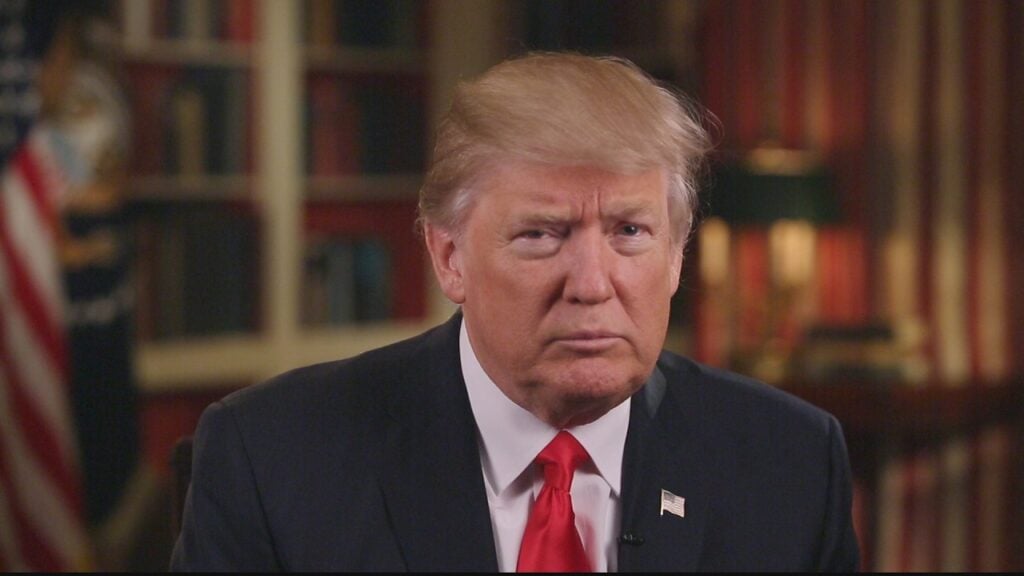Trump’s ‘More Militaristic’ Acts Box US Into Corner
Posted on

President Donald Trump
There is a narrative threading through Washington which smugly suggests that “instead of weakness, we now have strength” in the White House. After eight years of feckless “leading from behind,” President Trump has reasserted U.S. credibility, and as a result, our enemies fear and respect us again, resulting in a more secure global environment. In truth, current U.S. foreign policy is only accelerating the expanding use of force both of the previous two U.S. Administrations began – and the result is the accelerating decline of our national security.
In just the past two weeks, President Trump has launched a military strike on a sovereign nation without authorization by the Congress or a U.N. Security Council resolution, allowed the dropping of the largest conventional bomb in U.S. inventories in Afghanistan, and ordered two aircraft carrier strike groups into the waters near North Korea. These actions are in addition to requests from military commanders for more military power – including thousands of ground troops – in Syria, Iraq, Yemen, and Afghanistan. It is clear that these are not isolated events, but an expanding of a more militaristic foreign policy.

Daniel Davis
Trump sent a “message” with a 59-cruise missile strike on a Syrian airfield to dictator Basher al-Assad that he could not attack civilians with impunity, especially with chemical weapons. This message was answered 24 hours later with a message of Assad’s own when his troops used the same airfield to launch another air attack on the same area. His air force has not stopped operations since.
After being lectured by National Security Advisor H.R. McMaster, Russia responded with disdain – if anything, Putin is now even less likely to take actions beneficial to American interests. North Korea did not test a nuclear device last weekend as had been rumored, but officials insist they have no intention of stopping tests and will continue both ballistic flight tests and nuclear explosion tests. Deputy U.N. Ambassador from North Korea Kim Ryong defiantly said that “if the U.S. dares opt for a military action,” his country “is ready to react to any mode of war desired by the U.S.”
What will President Trump do if Assad continues to attack civilians with barrel bombs, Russia doesn’t do as we directed regarding Assad, and North Korea keeps testing missiles?
U.S. policy is now boxed into a corner because of recent threats and actions. If our enemies and adversaries ignore our president’s warnings and continue with actions we warned against, Trump will be forced to show his threats are without substance or – worse – he will be forced to escalate.
If Assad kills more of his people with barrel bombs or chemical agents again and President Trump launches a more punitive strike, he risks deepening U.S. engagement in a blistering civil war – the worst case scenario is accidentally killing Russian or Iranian troops, which could spawn a retaliatory strike against the thousands of U.S. troops in the region. U.S. planes might also get shot down by Russian anti-aircraft batteries in defense of Syrian airspace, as they have threatened. What would the President do then? He’d have to risk starting a regional war with Russia or backing down entirely. Either outcome would damage U.S. interests.
Probably the most serious situation, however, involves our position with North Korea. If reclusive leader Kim Jong-un makes good on his promises to continue testing missiles or conducts another nuclear weapon’s test and President Trump orders even a relatively small missile attack or air strike in response, the North may respond with missiles or artillery fire on Seoul. The population there is so dense that even a small attack could cause tens of thousands of casualties. If the South responded with an equivalent counter-strike, the Peninsula could spiral into a major war.
Many pundits in the U.S. claim with some confidence that such an act would be suicide for Kim, as his military is no match for the combined weight of South Korea and the U.S. That is likely true, but even a short-term war would almost certainly cause hundreds of thousands, possibly millions, of casualties on both sides.
Whether it is Russia, North Korea, Iran, or terrorist-related fights in Syria, Iraq, Afghanistan, Yemen, or North Africa, U.S. foreign policy in the current era is an unambiguous military-first endeavor. The Bush Administration began this strong change after 911, the Obama Administration continued it during his eight years in office, and the Trump Administration has shown signs of accelerating this trend. Rather than enhance American security, the threat environment for the U.S. has exponentially deteriorated as a result.
Using military force is a means to achieve a political objective. That’s why Congress is empowered by our Constitution to debate and authorize such actions. But by pursuing a grand strategy of “primacy,” responding with military force anywhere and everywhere merely because an opportunity exists, we have worsened our national security and over-extended our military.
It is long past time to change course and pursue a realistic strategy that will reduce tensions and improve US national security. Fail to make that change and we may one day discover that clinging to the status quo may perversely get us into a painful war that should otherwise never have been fought.
Daniel L. Davis, a former Army lieutenant colonel with four combat deployments best known for his critique of the war in Afghanistan, is a senior fellow for Defense Priorities, a thinktank.
Subscribe to our newsletter
Promotions, new products and sales. Directly to your inbox.
